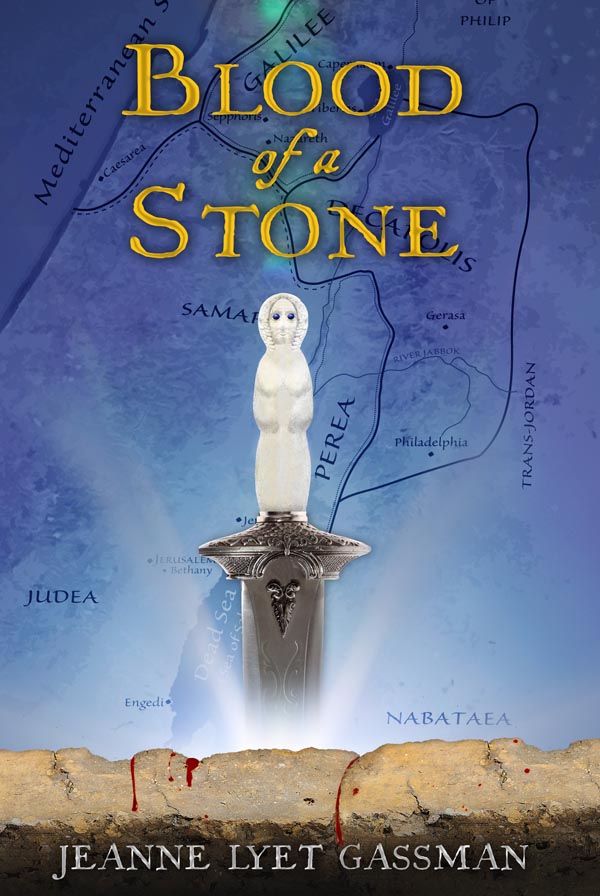
Publication Date: March 17, 2015
Tuscany Press
Formats: Hardcover, Paperback, Kindle
371 Pages
Genre: Historical Fiction
Set in the first century on the edges of the Roman Empire and the Jesus movement, Blood of a Stone is a sweeping story of murder, betrayal, love, and the search for redemption. Faced with the brutality of slavery, Demetrios confronts his master and flees by the blood of a stone. Determined to escape his past, he struggles to create a new life and a new identity with his friend and fellow escaped slave, Elazar. However, freedom has its price. Secrets cannot remain secret forever. A chance for love is lost. Elazar betrays Demetrios to a so-called prophet named Jesus of Nazareth. Fearing the Roman authorities and Jesus, Demetrios risks everything to silence those who would enslave him again. His quest leads him to startling discoveries and dire choices. Demetrios must answer the question we all ask: Can we ever be free of our past?
“Blood of a Stone takes the reader on an adventure in a fascinating period of history where the Roman Empire and the birth of Christianity converge. An extremely well written historical novel.” -Amazon Best Selling Author of The Olivia Series, Yael Politis “Jeanne Gassman has composed a spiritual journey of one man's heart-rending path to redemption on the fringe of the Jesus movement. Wrapped in polished prose and vivid depictions of life in 1st Century Palestine, Gassman's story transcends genres to offer a rich biblical tale of love, loss, forgiveness, and the restorative power of faith.” -Barbara Devlin, Bestselling Author of the Brethren of the Coast series "BLOOD OF A STONE by Jeanne Gassman is an enthralling, introspective historical tale that studies the human spirit in all its various forms: the good, the bad, the ugly and the beautiful. The novel is touching, wonderfully written and has a stunning story line that will stay with me for a long time. Highly recommend!" -Eliza Knight, USA Today Bestselling Author, My Lady Viper “Details of 1st-Century Palestine come alive as Jeanne Lyet Gassman weaves a compelling story of unspeakable challenge and the search for redemption. Trapped in a life of desperation, Demetrios will do whatever it takes to escape, even kill those who enslave him. But when his life comes in contact with the man, Jesus, everything that seemed so important begins to shift. The story moves from pulse-pounding action to heart-wrenching honesty, as Demetrios pursues the Peace every heart craves.” -Amazon Best-seller Author, Christy M. Bellar, The Lady and the Mountain Man "Grace, one of the most challenging journeys of life and literature, is explored in this fine debut novel by Jeanne Lyet Gassman. Set in first century Palestine during the time of Jesus, BLOOD OF A STONE is a moving, well-researched, beautifully turned novel that had me engaged and in tears. Highly recommended!" -Best-selling author Allegra Jordan, The End of Innocence "Jeanne Gassman is a remarkable writer who brings a Biblical era stunningly to life in this powerful and fast-moving tale of sin and redemption." -American Fiction Prize Winner, Clint McCown, author of Haints "In art man finds a conduit to the divine. Blood of a Stone, Jeanne L. Gassman’s artful debut, is a tale of murder, love, betrayal, and redemption in 1st century Judea. Crafted with imagination and superlative style, her story tracks slaves Demetrios’ and Elazar’s arduous climb from sin to forgiveness." -Winner of the Independent Publisher Book Award, David Beckett, The Cana Mystery "Jeanne Lyet Gassman's stunning evocation of 1st-century Palestine in all its teeming, multifaceted complexity compelled me, page after page, to follow the fateful pilgrimage to Jerusalem while also walking the rocky path from undeserved suffering and terrible guilt to the possibility--open to all of us--of forgiving and being forgiven." -Diane Lefer, co-author of The Blessing Next to the Wound "Blood of a Stone is a gripping story of friendship and betrayal, love against all odds, a brutal Roman Empire, and the threat of a revolt that becomes instead the beginnings of freedom. Jeanne Lyet Gassman tells us what it was like to live in the time of emperors and slavery, a world into which Christ was born." -National Book Award Winner, Gloria Whelan, Homeless Bird "A meditative journey on the ways that life cripple us all -- and the choices we make that lead to bitterness and blame or joy and forgiveness -- Gassman's BLOOD OF A STONE is a biblical journey of self-discovery that will strike a chord in every reader." -Michelle Zink, Author of Prophecy of the Sisters Trilogy "Jeanne Lyet Gassman is an astonishingly good writer. The ancient world of Blood of a Stone feels alive on every page. And if you think there's nothing fresh to say about the fragility of freedom and the difficult road towards redemption, this novel—chock-full of compelling characters and propelled by a polished, downright luminous prose—will provide new and heartfelt insights." -Nance Van Winckel, author of Boneland: Linked Stories "In Blood of a Stone, author Jeanne Lyet Gassman leads the reader on a journey of surprise and suspense. Her well-researched work is the story of Demetrios, a slave who sinks to murder to defend his own life. He is a Gentile, in partnership with Elazar, a Jew. They travel Palestine in the midst of the Jesus movement and each in his own way finds his life changed." -Wall Street Journal Top Ten book selection author, Donna Foley Mabrey, MaudePraise for Blood of a Stone
Available at
Amazon Amazon (Kindle)
 About the Author
About the Author
Jeanne Lyet Gassman lives in Arizona where the desert landscape inspires much of her fiction. She holds an MFA in Writing from Vermont College of Fine Arts and has received fellowships from Ragdale and the Arizona Commission on the Arts. In addition to writing, Jeanne teaches creative writing workshops in the Phoenix, Arizona metropolitan area. Her work has appeared in Hermeneutic Chaos Literary Journal, Red Savina Review, The Museum of Americana, Assisi: An Online Journal of Arts & Letters, Switchback, Literary Mama, and Barrelhouse, among many others. Blood of a Stone is her debut novel.
Author Links
Capturing the Flavor of Ancient History
Guest Blog Post
by Jeanne Lyet Gassman
Author: BLOOD OF A STONE
As a historical writer, my job is to immerse the reader into the time and place of my stories. In my historical novel, BLOOD OF A STONE, I have a number of references to food and meals. Why food? The preparation of food and the eating of food speak to all five of the senses. We can visualize the crimson seeds of a pomegranate, taste the sharp spice of garlic, smell the fish hauled in the fishermen's nets, hear the creak of a millstone, or feel the slick texture of fresh olive oil. What characters eat and how their food is prepared and served provides insight into their social status, ethnic heritage, religious beliefs, or geographical location.
Set in first century Palestine, BLOOD OF A STONE is populated with the diverse cultures that occupied the region, including Romans, Jews, and Gentiles, non-Romans who worshipped pagan gods. Each one of these groups has its own rituals regarding food.
The Romans, for example, believed that reclining on one elbow while dining aided digestion. But think about this for a moment: If you are sprawled on a couch, you cannot feed yourself. You need a slave or servant to serve you, so although dining while reclining was popular in Roman culture, only the wealthy or privileged Romans could afford to do so. The Jews washed their hands before eating, an action described in the Bible before the Last Supper. Pagan Gentiles often made small sacrifices to the house gods before eating, usually setting aside a portion of the food or wine for the gods.
Wealthy Romans could afford to indulge in a rich and varied diet. They enjoyed such delicacies as stuffed dormice, garum (a popular fish sauce), and roasted wild boar. The Jews were more concerned about eating "clean" foods. Only cud-chewing animals with cloven hooves, such as cows, were permissible to eat. Pigs were considered unclean. Of marine creatures, only fish with fins and scales were considered to be clean. These dietary laws had some basis in good health practices, as the meat from pigs, for example, carried disease, and seafood, such as oysters, spoiled quickly in the heat. Most Gentiles could not afford the extravagant choices of the Romans, but they had few dietary restrictions and ate what was in season and available.
Except for the wealthy Romans, the average daily diet was primarily vegetarian with the occasional fish, wild hare, or pigeon as a supplement. Goats and lambs were slaughtered for celebrations and sacrifice. Although Romans preferred bread made from wheat, the most common bread in first century Palestine was baked from barley. Small loaves were stuck to the sides of an oven chimney and baked, or the dough was spread out across an earthenware plate over a hot fire. The latter baking method produced a pancake, which was used as scoop for eating, since there were no formal eating utensils.
Honey, not sugar, was the primary source of sweetening foods. The wealthy preferred to drink wine with meals, as the water could be unsafe. However, most travelers carried waterskins made from the skin of goat or kid, as wine was more difficult to transport. Olive oil was a staple in everyone's diet, and had multiple uses, including a base for sauces, a moisturizer for bread and cakes, a dip for vegetables and bread, and when blended with spices or perfume, an ointment.
In BLOOD OF A STONE, the hero, Demetrios, rises from a slave to a prosperous caravan driver who holds a slave of his own, and his relationship to food reflects these changes. He begins the story by scavenging his Roman master's garbage for scraps of spoiled food. As the tale progresses and Demetrios becomes established in Galilee, he dines on fish and vegetable stews prepared by his slave, Rufus.
As an author of historical fiction, it was a pleasure to research and test ancient recipes to learn what it was like to live in first century Palestine. I will leave you then, with a recipe for a simple cucumber salad. This recipe is taken from the book, Foods from the Bible: With Recipes You can Use Today (Globe Digest), and is similar to a salad Rufus might have prepared for Demetrios:
First Century Cucumber Salad
1 cucumber, peeled and chopped
1 small onion, chopped
1 Tablespoon fresh mint or parsley
1 Tablespoon olive oil
1 Tablespoon lemon juice or vinegar
1 teaspoon minced garlic
Salt and pepper to taste (Note: Salt was common in ancient Palestine, but pepper was rare and quite expensive.)
Combine all ingredients. Chill before serving. (Note: You can add a chopped tomato for more flavor, but tomatoes were unknown in the ancient world.)
Blood of a Stone Blog Tour Schedule
Monday, May 4
Spotlight at Curling Up With A Good Book
Tuesday, May 5
Excerpt at What Is That Book About
Wednesday, May 6
Spotlight at Cheryl's Book Nook
Thursday, May 7
Excerpt & Guest Post at Curling Up With A Good Book
Friday, May 8
Review at Book Nerd
Tuesday, May 12
Review at Book Lovers Paradise
Wednesday, May 13
Review at With Her Nose Stuck in a Book
Guest Post at Book Lovers Paradise








No comments:
Post a Comment